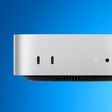Other World Computing (OWC) today announced a new software solution that allows users to combine the speed of a solid state drive with the increased storage space of a traditional hard drive. The new Transwarp technology was previewed for the first time this week at CES 2015.

While SSD caching is not new, OWC's Transwarp solutions aims to make it easy for Mac owners to combine a removable SSD and HDD into a single data volume. Unlike Apple's Fusion Drive which also pairs an HDD with an SSD, OWC's Transwarp setup uses the HDD to hold all the data and the SSD as a cache, storing only the most frequently and recently accessed data on the faster access volume while the traditional hard drive retains a complete copy of all data.
With Transwarp, the SSD also can be removed as needed, allowing users to travel with only the HDD installed in their computer. When the SSD is reconnected to the OS X system, OWC's Transwarp technology takes over and again combines both drives into one.
Transwarp persists even when the power is turned off. Once the SSD is reconnected, Transwarp seamlessly picks up where it left off, making it a great option for laptop users looking for the flexibility to be light on the road, but fast at home or in the office. Converting a drive from Transwarp happens as quickly as it is created, returning both drives to regular volumes within minutes.
OWC is only previewing Transwarp at CES 2015. The company has yet to announce a formal launch date beyond "later this year" or suggested retail pricing for the drive technology.




















Top Rated Comments
The problem with your method is that it's time consuming.
1 - Every time you save a file you have to think about whether you want it on your SSD or your HDD.
2 - You have to remember to manually move files between your SSD and HDD.
3 - You have to remember whether you saved it on the SSD or the HD.
That might not seem like a huge cost, but it's seconds a day, every day, for years, which means it costs you hours/days over years.
This sounds interesting to me... but I feel like I'll only be holding onto my current computers for a few more months. Worst case they'll get replaced at the end of 2016. And whatever replaces them will probably be SSD only.
The thing is, not every frequently accessed file needs to be accessed at highest speeds.
There is practically (user facing) no difference between saving a 5MB Word document to HDD vs. to SSD.
Will you be able to tell the difference? Maybe, sure, but will it improve your workflow?
Is it worth a solution that involves proprietary data storage technology?
If you are like me, all the executables are on the system drive anyways, along with all the scripts that execute and files like libraries of applications like iTunes, Aperture (farewell... :rolleyes:) and so on.
The actual media files are on drives that need not be very fast.
How fast does that video of yours need to be streamed from your storage to RAM?
Anything above bitrate+overhead will do.
1080p plays very nicely from a USB2.0 drive, why would I like to cache it to SSD only because I may access it frequently?
Just an example, but there really is no need.
Frequency does multiply the time you save each time, but not all time saved/all maximum speed is needed.
Since I have a system for storing my files, personal files, in folders, naturally it's easy to assign drives as well, they are practically just a sort of "top level folder" in my thoughts like Music and Documents to others within their home directory.
From there on come the subfolders and the eventual filename.
So all files that I do not know of theoretically are on my system drive anyways.
Make an SSD your system drive, solve your speed problems.
Glassed Silver:mac
Or you can put files where they belong in the first place. People have been manually managing files for years. As long as you have a plan... it's not a problem.
Like Glassed Silver... I have multiple hard drives. But there is no problem of "remembering" where to save files. They go where they belong.
My OS and apps are on the SSD.
All my personal and general files are stored on a spinning hard drive.
I have another hard drive that is just for editing video. All video projects and media belong on that drive.
And I have a portable hard drive just for my websites. All files relating to websites belong on that drive.
Data that is read once might be 10 milliseconds faster from SSD and that's all the time you save is 10 milliseconds but data that is read 1,000 times per session will save you 10 seconds total. You are not likely to know what data you are frequently accessing. It might be some executable code in the /Applications folder that keeps getting mapped in. It's certainly NOT that Word document you are working on because it would be cashed in RAM and read off the disk once. Most of the stuff is going to be bits and fragments of the operating system or maybe some media files you are editing.
And then you have the problem of when you leave home you have to copy back all the changes to the data you made on the SSD to sync the HD.
I think Apple's fusion drive is the best idea for a non-removable SSD but this seems like a good way to used a small SSD. Adding a 128GB SSD might make the computer MUCH faster with little effort and then there is nothing to do when you leave home or office but unplug the drive, no re-sync needed.
----------
OWC is in the bossiness of selling upgrades to people who own older computers. This is a way to let people use their HDD based computers another couple of years. It's not for those with new computers
I'd rather have a manual system SSD/few data + big HDD combo.
Trusted method, no worries.
Also, the data I need at fast speeds is determined by more than frequency or shall I say short-term frequency.
Not saying their algorithm is bad, but I like granular control and predictability.
Glassed Silver:mac